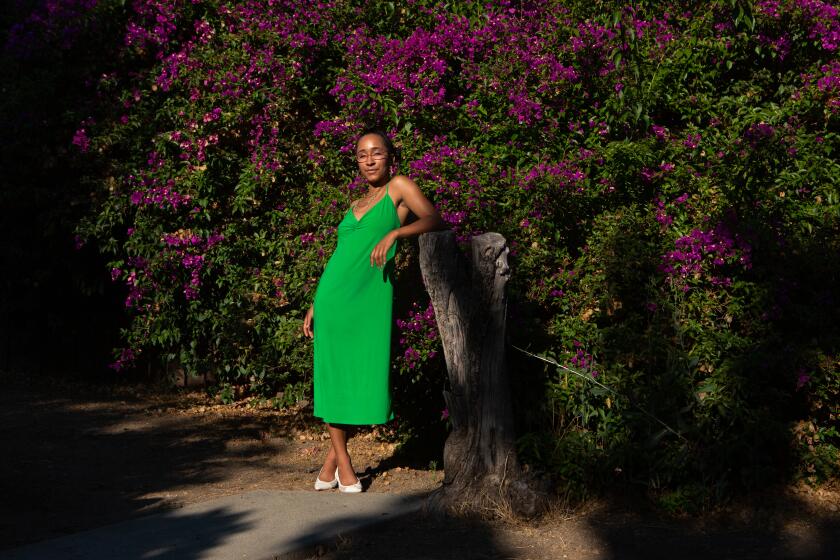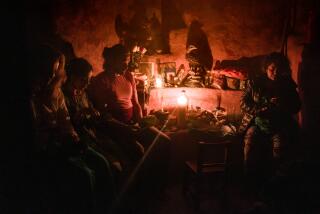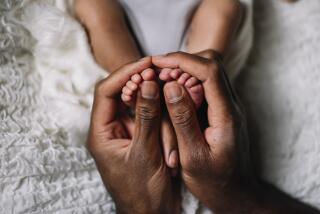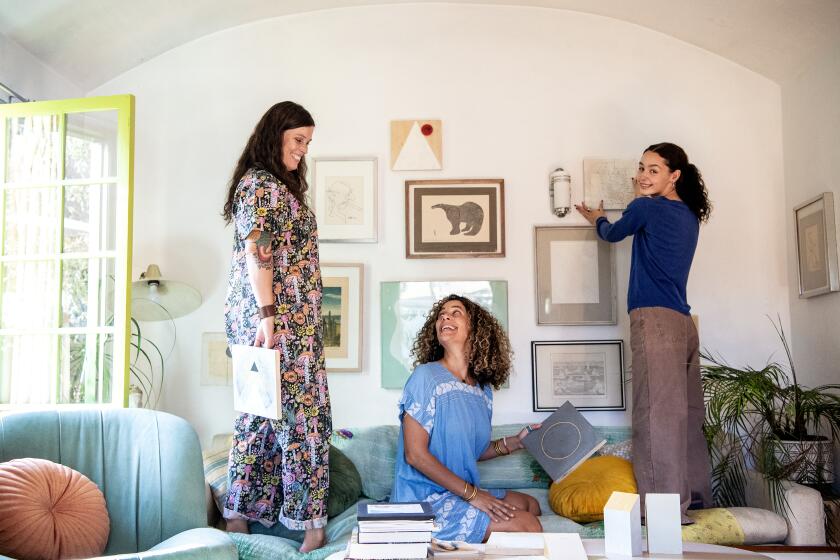Hood Herbalism is the internet phenomenon bringing herbal education to birth work
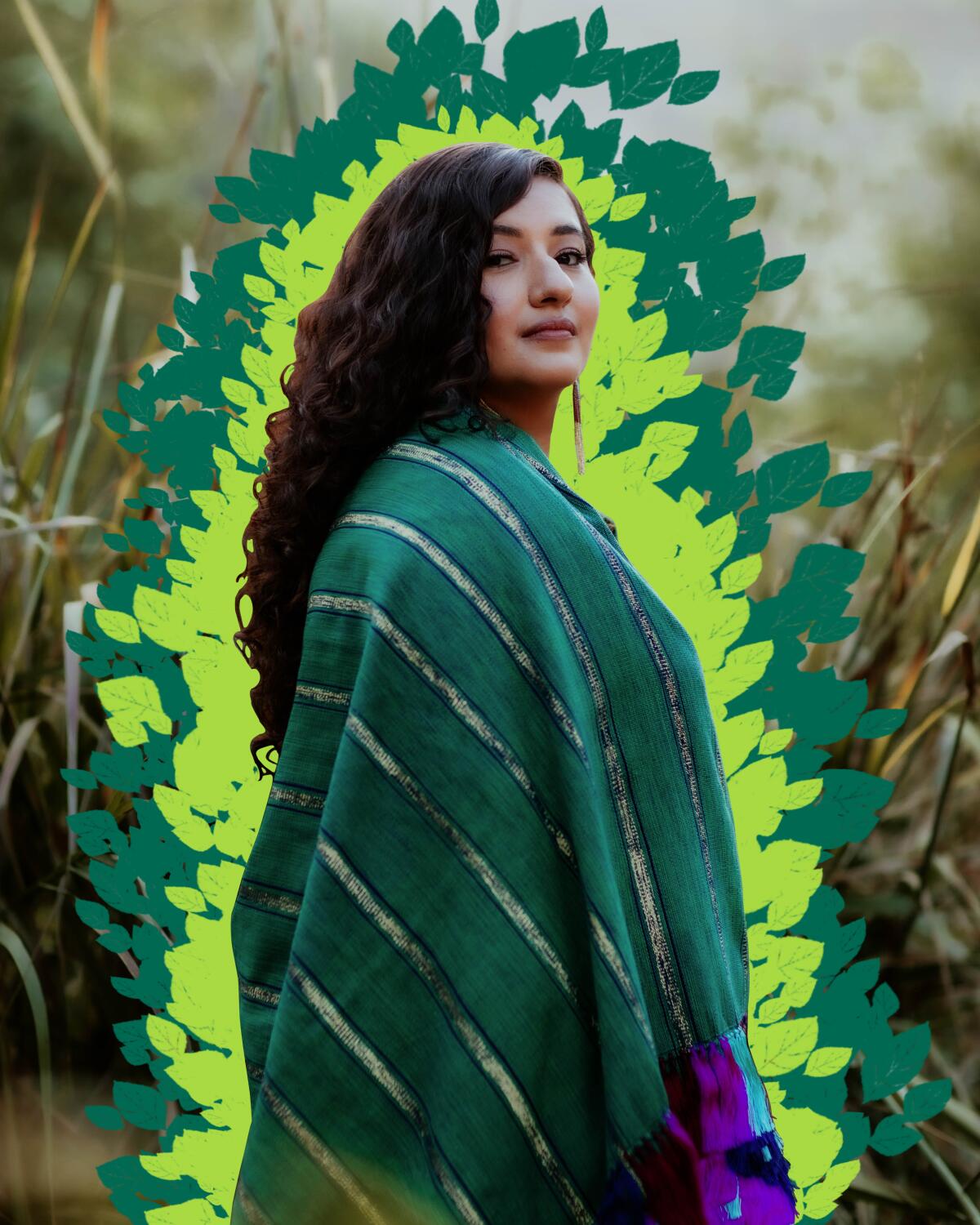
Berenice Dimas, a doula and herbalist from East L.A., is full of the wisdom of those who came before. Here’s a sample:
For resilience during pregnancy, dandelion essence.
To provide iron and minerals in preparation for birth, alfalfa, Mexican honeysuckle, moringa.
To help with milk flow and nutrients after birth, blue corn atole.
To offer gratitude when harvesting plants: prayer, blood, water, compost, song.
These aren’t your average pre- and postnatal prescriptions. But Dimas isn’t your average herbalist. The founder of Hood Herbalism, which offers community-based herbal education to Black, Indigenous and other people of color, Dimas travels up and down the state teaching thousands of people to connect with the plants around them. Her Instagram channel offers nearly 60,000 followers recipes, re-shares of plant-inspired art and quotes, and glimpses into her hands-on herbal medicine work with groups of all ages.
Recently she has been marrying her deep herbal medicine knowledge with midwifery training, an undertaking she says was born from repeatedly witnessing racist treatments in hospital rooms that contribute to high infant and maternal mortality rates for people of color.
Now Dimas is virtually guiding an expanding network of BIPOC birth workers to make plants their allies by digging into the dirt and their own family’s ancestral traditions.
Dimas’ own roots in herbal medicine come from her mother, but she formalized her practice after learning from traditional herbalists in Mexico and Western herbalists in the U.S. Since hosting her first class in a friend’s East L.A. backyard six years ago, the 36-year-old has focused on equipping BIPOC communities with accessible plant remedies to address the health concerns most impacting them.
For Black, Indigenous and some Latinx communities, death from causes related to childbirth is disproportionately high in a country that already ranks worst among other wealthy nations in maternal care. Expanding a range of birth settings with access to doulas and midwives is one way advocates hope to close the gap, and birth workers are reaching for as many tools as they can get to address the crisis. Accessible, culturally relevant plant medicine is one of them.
Dimas says her relationship with plants began before she started her business, before she knew how to name the medicine that cured her fevers or infections as a child. It began with her great grandmothers, who passed down Indigenous plant remedies from Mexico until they landed in a container garden in El Monte, a largely Latinx city in the San Gabriel Valley.
Born in Mexico City, Dimas moved to L.A. with her family when she was 3. Her mother had a penchant for using her potted plants to cure ailments for family and neighbors. The practice was not only natural; it was also safer and more efficient than wrestling with a new language or an unfamiliar hospital system.
Later, while Dimas was teaching high school in the Bay Area, she came across classes that put a label on the wisdom she grew up with: herbal medicine. She dived into what she calls spirit work, helping clients heal from shock or trauma with herb-laced spiritual cleansings known as limpias. She moved back to L.A. to nourish the city that raised her; the business name is a nod to the resourcefulness of the hoods she has called home.
“Even though there’s concrete everywhere, there’s always green growing through,” she said. “Despite having less access to green spaces in my community, there were so many people on my block that were growing different things.”
Herbalists often follow family traditions in plant medicine, but Dimas’ route into birth work was inspired by a dream of her grandmother, who appeared about three months after her death, telling her granddaughter to learn about birth. Dimas wasn’t sure what it meant, but soon after she received an email about a doula training program for people of color.
She completed her doula training in 2014, after learning for a year from nurses and midwives and performing free births alongside a doula mentor.
While doula offerings vary, their primary role is to provide emotional support, resources and advocacy before, during and after childbirth. The work was rewarding, but she witnessed microaggressions, bias and criminalization toward her clients in hospitals. Once she was left in tears, feeling helpless when a woman of color was threatened during labor with a court order for wanting to hold off on a cesarean.
Structural and interpersonal racism can make childbirth in a hospital setting unsafe for people of color: Black, American Indian and Alaska Native women giving birth are two to three times more likely to die from pregnancy-related causes than those who are white, and those rates increase with age. The death rate for Black babies is twice as high as it is for non-Hispanic white babies.
“Those numbers for me are unacceptable, and I just couldn’t walk away from them after witnessing how many people in my community are losing their lives at the hands of people in hospitals violating their right to a just birth process,” she said.
Since racial uprisings erupted earlier this year, Black herbalists have begun ramping up resources for Black people going through stress and trauma, exacerbated by a pandemic that’s disproportionately killing their communities.
Dimas is enrolling in midwifery school — which allows her to play the role of a licensed medical provider during the birthing process. While doulas aren’t permitted to make any medical decisions, as a midwife she’ll be able to provide medical care and have more autonomy.
Part of what makes plant medicine appealing, especially for dramatic transformations like pregnancy and birth, is that it incorporates physical, emotional and mental well-being. But in Dimas’ doula program and other programs at the time, the conversation around plant medicine was never at the center. Even now, as doula services become more institutionalized, Dimas says some contracts with hospitals specifically prohibit plant medicine recommendations.
“I was interested in learning about the uses for plants in birth support, and it just became a rabbit hole that led me to now being in midwifery school and sharing the information that I know,” she said.
Herbal medicine has been stigmatized for pregnant people by Western medicine despite traditions that go back thousands of years. But Western medicine is built on medical interventions — surgeries, medicine. This is why Dimas started conducting classes in herbalism for birthworkers.
One of Dimas’ students, Prashante Bailey-Lewis, a natural hair care specialist in Sacramento who is 25 weeks pregnant, shared that her doctor prescribed her medicine for preeclampsia and gestational diabetes based on general statistics, while making no note of her current bloodwork and lifestyle. She was also discouraged from using natural medicine, something that’s been familiar to her since her youth.
Plant medicine can be preventive, helping the body adjust to changes as it grows a baby. It also can be subtle enough for pregnant people who might have strong reactions to certain flavors or can’t take other medicine. And Dimas uses remedies such as flower essences to help restore emotional balance when there are feelings of anxiety or when clients are faced with traumatic life events.
Maria Lozano was one of Dimas’ early students, and shortly after she gave birth to her child, her mother died. Other herbal practitioners came to her side with treatments that nursed her grief and her body.
“Dealing with grief, having a new baby, having breastfeeding issues — we know which plants energetically can respond and support those needs,” she said.
Lozano herself is a doula and clinical licensed social worker in Ventura County who began learning about plant medicine as a way to reconnect with her Mexican roots and affirm the lifestyles of families she came across as a community mental health provider. Since her mother’s death, she’s inherited her garden, caring for a corner of luscious spearmint, avocado and orange trees, and roses that she uses for her clients’ postpartum baths. Dimas encourages students to plant and use what grows in their climates; that way plant medicine can be accessible to anyone.
Building these types of long-term relationships with plants is important to Dimas, especially considering herbal medicine’s fast rise to popularity in the U.S. Shrinking habitats and overharvesting have put some species at risk, an alarming situation for people who depend only on herbal medicine. For Dimas, it’s a political decision to skip the store-bought plants or essential oils coming from unknown sources and grow plants ourselves.
“Plants are not just here for us; they’re here for so many other ecosystems too,” she said.
She wants students to think about plants’ migration patterns or the appropriation of plant medicine and how to support certain plants’ longevity.
Plant relationships should also be reciprocal, according to Dimas, who asks her students to think about what offerings they can give back to those plants.
“I always tell the students that plants have living, breathing spirits,” she said. “We have to think about them not as objects or things that can be commodified.”
For Dimas, the dream is to eventually open a birth center in South East L.A. that can offer reproductive health services, family planning that’s inclusive for queer and trans people, an herbal medicine garden and, if appropriate for the patient, a place to give birth.
More to Read
Sign up for our L.A. Times Plants newsletter
At the start of each month, get a roundup of upcoming plant-related activities and events in Southern California, along with links to tips and articles you may have missed.
You may occasionally receive promotional content from the Los Angeles Times.

